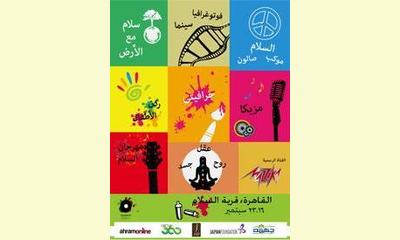|
|
MasterPeace in Cairo
un articulo por ahramonline
Cairo joins the world in celebrating the UN International Day of Peace on 21 September with events taking place throughout the city between 16 and 23 September.

click on photo to enlarge
MasterPeace is a global peace movement of artists, activists, journalists, cities, companies and members of civil society who believe that world peace is possible if enough people work for it.
Through music, art, sport, new media and an International Day of Peace, MasterPeace encourages dialogue, togetherness and social sustainability in small local neighbourhoods through to large conflict areas worldwide.
With events taking place between 16 and 23 September, Cairo will turn into a heart-warming peace village with more than 10 activities providing people with unique opportunities to experience different meanings of peace.
Building on last year’s one-day pilot event at Gezira Sporting Club, MasterPeace is this year planning to run different events for seven days around Cairo, everyday with a new theme ranging from peace with Mother Earth to peace with inner self, in an attempt to promote the “peace experience” in funny, engaging and exciting ways.
In cooperation with tens of non-governmental organizations, bands, musicians, artists, and lecturers, “Peace Village” will witness mainly the participation of Egyptian youth, who after leading one of the most peaceful revolutions in history have the responsibility of spreading a culture of peace and tolerance throughout Egyptian society.
“Cairenes are invited to take part, along with people in more than 150 cities around the world, in events like ‘Peace Parade’, community service, yoga and inner peace, peace salons, and peace with planet earth,” Momen Zaki, Peace Village project manager said.
With the theme “From the new born Egypt, a new born heart-warming peace initiative” this year’s event is extra special as it will mark the official launch of MasterPeace, crowning two years of intensive preparations. Voices for peace will be raised in Cairo, Utrecht in the Netherlands and other places throughout the world in events that will be broadcast simultaneously through satellite.
It is the aim of MasterPeace that in three years millions of people will have formed a positive global movement of peace-builders, who will be rewarded for their efforts at a MasterPeace Concert in Egypt on Peace Day 2014.
Ahram Online is one of the media sponsors of the event.
|








|
DISCUSSION
Pregunta(s) relacionada(s) al artículo :
The Arab spring of 2011, Can it inspire democratic movements around the world?
* * * * *
Comentario más reciente:
The following is reprinted from Common Ground News Service (CGNews), 30 August 2011, www.commongroundnews.org
Copyright permission is granted for publication.
Cultures of peace, lasting change in Egypt?
Joseph Mayton
Cairo - Instead of falling victim to Egypt’s eye-for-an-eye past, a concerted effort to create a culture of peace in what has quickly become a starkly fractured political scene – between religious groups, the military and activists, and activists and the people – may well be the best opportunity to bring about a new Egypt with social justice, transparency and tolerance.
Egyptians are striving daily to show the world that societies can change. Cairo is not the same city it was six months ago. As voices now begin to breech the political and social stalemate in the country, Egyptian society can, through a culture of peace, set a precedent not only for their own country but for the whole region.
UNESCO defines the culture of peace as “a set of values, attitudes, modes of behaviour and ways of life that reject violence and prevent conflicts by tackling their root causes to solve problems through dialogue”. In Egypt, for example, this could help develop an overall sense that the "other", who participated in violent acts in the past, can become part of society, instead of remaining on the outskirts as they are currently. Building such a culture in Egypt would follow the South African model of reconciliation, which allowed the country to look forward instead of focusing on the frustrating and sad past of apartheid.
Instilling a culture of peace in the younger generation could be a great antidote to the older generations’ mistrust and antagonism toward one another – Christian versus Muslim; Worker versus Owner; Military versus the People; and so on.
In Egypt, one of the root causes of a lack of a culture of peace is the educational system. Young Egyptian students are taught that they are different from one another, that their respective faiths are cause for separation. In schools, Christian students study the history and faith of Christianity separately, while Muslim studentsdo the same for Islam. This creates a sense that each group is separate and divided when it comes to any national cause. . ... continuación.

|
|








